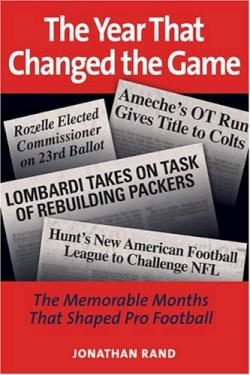The Year That Changed the Game
The Memorable Months That Shaped Pro Football
Younger football fans can’t conceive of a time when conditions weren’t as they are today, with multi-million-dollar contracts and 300-pound linemen the norm. But the modern NFL did not spring on the scene whole cloth; there were pioneers and a watershed event.
Rand, a sportswriter specializing in football, traces the months immediately following the 1958 championship game between the New York Giants and The Baltimore Colts. The contest, often referred to as “the greatest game ever played,” was the light bulb that showed football was on the verge of something big. The title game—the most watched sporting event on television to date—was evidence that football was ready to take that giant leap forward.
Readers might be curious about the disproportionate amount of narrative given to football in the Lone Star state. Indeed had Lamar Hunt—son of billionaire oil man H.L. Hunt—been granted his wish and allowed to buy a franchise in Dallas, who knows what the game would be like today. He was turned down by the NFL, but rather than take no for an answer, Hunt labored until he got not just one team, but a whole new entity: the American Football League. In response, the long-established NFL countered by adding a few new teams of their own.
Other legends of the game who came to prominence during the year include Vince Lombardi, a coach for the Giants, who implemented his win-at-all-costs philosophy to turn the heretofore sad sack Green Bay Packers into a proud dynasty. Also notable was Pete Rozelle, who began a long tenure as commissioner of the NFL while still in his thirties.
Aside from the players, a/k/a the “meat on the hoof,” technology begins to impact the game’s development. Rand reports on the first use of computers in evaluating talent, as well as the great god television, which would help finance the league, especially beneficial for small-market teams.
Rand pays tribute to Bert Bell, Rozelle’s predecessor as commissioner, who died in 1959. Like Moses, Bell was able to see the “promised land” from the distance, but was unable to be there for the festivities.
Sports is the ideal environment for hyperbole. It seems every other book these days features the words “best” or “greatest” or “forever” in their titles. In this case, however, the sentiment—if not the actual phrase—is most appropriate.
Disclosure: This article is not an endorsement, but a review. The publisher of this book provided free copies of the book to have their book reviewed by a professional reviewer. No fee was paid by the publisher for this review. Foreword Reviews only recommends books that we love. Foreword Magazine, Inc. is disclosing this in accordance with the Federal Trade Commission’s 16 CFR, Part 255.

